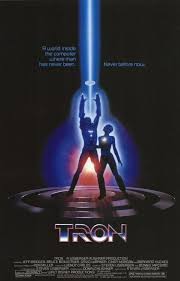I’m fairly not always certain about watching movies of the 80s era but after reading about Tron: Legacy, released now in 2010 being a sequel not a remake of 1982’s cult phenomenon I simply had to watch it if I was to actually understand what is the plotline for the sequel. So, here it is –
Tron is at most supremely silly but a groundbreaking one all the same and its state-of-the-art, computer-generated visuals look primitive by current standards as in the standards of the sequel “Tron: Legacy”, it's intelligently conceived (on a visual level, at any rate) and largely good fun. Steven Lisberger, an East Coast animator, directed the visuals, combining the actors and computer graphics with satisfying results. At the time of the film's release, Disney was trying to bridge the market from the near-dead "family film" to a more sophisticated product. The studio's first PG-rated offering initially did poorly at the box office, but when a TRON-inspired video game hit the arcades, the film picked up business.
Its special effects, which frankly looked chintzy back in its day and appear comically simplistic now, still represented the first major Hollywood film to employ computer-generated imagery, or CGI, on a large-scale basis. Yes, it was crude stuff, but it was the first stumbling steps of a whole new realm of filmmaking technology.
“Tron” is best seen as the maiden voyage of an expedition that has led us to wonders like Gollum from the “Lord of the Rings” movies and the Na’avi in “Avatar.”
The thing that most stood out for me is that the title comes not from star Jeff Bridges’ character, but from Bruce Boxleitner’s. Bridges plays Kevin Flynn, a talented young video game designer ousted by the mega-corporation Encom. It seems the boss, Ed Dillinger (David Warner), stole several of Flynn’s game designs and now he’s hacking into the system in search of proof and a payday.
Alan Bradley (Boxleitner) still works at the company, and has come up with a security program that will not only protect their system, but also serve as watchdog over the Master Control Program, or MCP, to which Dillinger has turned over an increasing amount of control. Master Control, as is the wont of all 1980s computers, grows sentient and moves to eliminate the interference of those pesky humans.
The cleverest conceit of writer/director Steve Lisberger’s script is having all the principle actors play dual roles inside the computer world. Here, all computer programs are thinking individuals who want to carry out their intended functions, only to have them blocked or usurped by MCP. The concept of humans or “users” creating and controlling them has been forbidden, and those who persist in believing thusly are treated as part of a cult.
I also loved that everything there happens on computer time — which is to say, very very fast. Someone refers to something deep in to the future as being 200 nanoseconds away. The long, evil reign of Master Control began earlier in the same humans’ day, when Dillinger shut off his programmers’ access.
Boxleitner, of course, plays Tron, who is something of a resolute knight-errant, questing to restore faith in the Users. Flynn’s hacking program is Clu, which was captured by Master Control and “de-rezzed” early in the movie. Then Flynn himself is atomized by a laser and transported into the computer world, where as a User he finds he has certain god-like powers to manipulate reality.
Warner had three roles: Dillinger, the voice of MCP, and as Sark, the evil general who carries out its orders. Master Control is Sauron-like, an unmoving entity who wields great power despite being little more than a disembodied voice and face.
Warner has a great, laughable line where they’re trying to break through a force field in pursuit of Tron, and he turns to his henchman and shouts, “Bring in the Logic Probe!” For pure ’80s cheese, this dialogue rivals “No! Not the bore worms!” from “Flash Gordon.”
Cindy Morgan plays the love interest of Alan, Flynn and Tron. Flynn finds that Alan has stolen his girl in the real world, and finds the dynamic replicated in the computer one. As is often the case in movies of this sort, the lead female is completely unnecessary to the plot, and could be written out of the story with little effect.
I was surprised to find that the video game sequences with the light bikes and discuses, which are what everyone seems to remember most about the movie, take up such a small part of it. I still haven’t puzzled out the deal with the Recognizers — those strange, obelisk-like structures that fly around the computer world in search of prey.
In retrospect, Tron may be the film that kicked off a generation of movies about guys getting sucked into the operational innards of powerful computers. Visually, this film is state of the art, à la 1982, and Jeff Bridges turns in some of his better work. It's interesting to see how this relic holds up. I did enjoy it but in my opinion the title should be something other than “Tron” since he isn’t the main character, a likelihood I’m sure you’ll all have noticed in the title choice of the play Julius Caesar by Shakespeare.


No comments:
Post a Comment